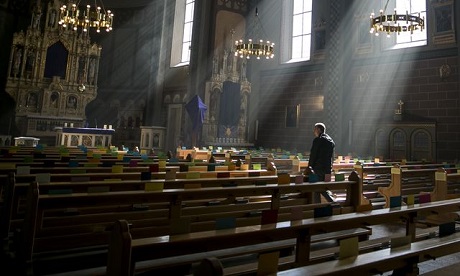Priests may be feeling non-essential as quarantine restrictions meant to slow the spread of the coronavirus (COVID-19) have distanced them from their parish communities.
Many churches have had to close or limit their activity in recent months and priests are struggling to support or even engage with their community, a psychologist says.
Dr. Christina Lynch says the quarantine measures around the US may be causing priests to struggle with their priestly identity.
Encouraging them will help them overcome these challenges, she suggests.
“Shepherds have been removed from their flocks, and flocks have been removed from their shepherds. They’re losing their sense of priestly identity and purpose.”
“A newly ordained priest [told me], ‘I am not a minister without a community, and it’s been really hard’”.
There’s a reason God created today’s priests at this particular moment of pandemic and riots, Lynch says – to bring the sacraments to the people “… and they need to support each other in that.”
Although some dioceses haven’t reopened to the public yet as they are considered non-essential, many priests are again offering public Masses for the first time since March. However, there are limitations on attendee numbers and regulations including the use of masks and hand sanitiser have been introduced.
Lynch is researching the effect the coronavirus restrictions are having on priests so she can help prepare psychologists to support them.
Her research includes a survey of about a dozen priests, representing different parts of the country and different priestly demographics.
They were asked how the pandemic has affected their mental health, what type of support they need and what pressures they expect in the future.
Those surveyed said they were experiencing a greater psychological strain from the pandemic, resulting in loneliness, depression, cynicism, anger, and fear.
“The number one message I heard was that this quarantine has brought to the surface a growing crisis in priestly identity,” Lynch says.
Being without parishioners has led some priests to feel isolated and purposeless – and because priests are limited in their interactions and ministerial duties some feel like they are trapped and lacking control.
“They’re getting that message from the secular … the governments. They’re opening all these other kinds of stores and saying they’re essential. [But] the churches can’t open… They don’t consider the spiritual, and yet people thrive when they have faith and when they’re in community.”
The pandemic has also caused “decision fatigue” and forced priests to make choices they may never have faced before, such as large staff cutbacks. Some are finding it more difficult to pray, Lynch says.
Parishioners need to show their appreciation for their pastors, and priests need to offer fraternal support to one another, to help combat these difficulties, Lunch suggests.
“I think building comradery, calling priests in your fraternity when you’re friends with them or not, and just reaching out and supporting each other. I think that’s one of the best things priests can do to help each other.”
Source
